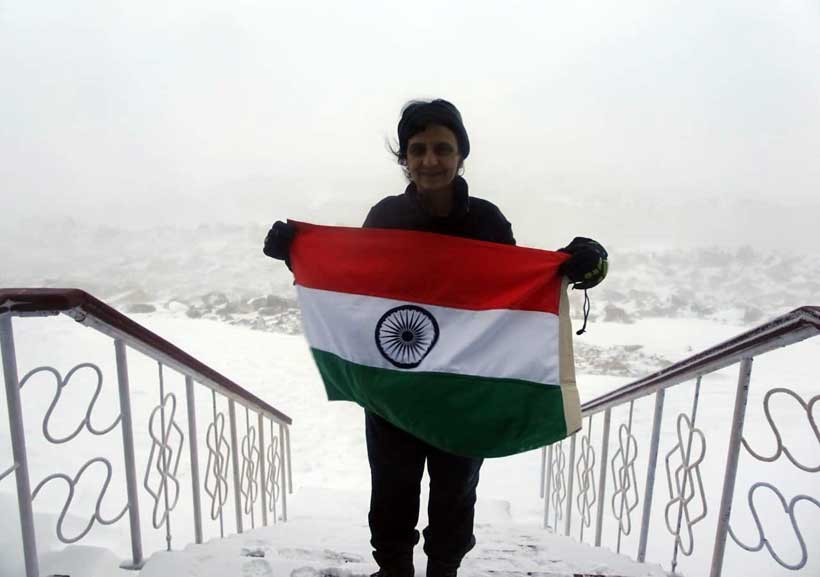As Dr. Madhubala Chinchalkar walked in for the interview, the panel asked,” You will be the only woman in the team, is that alright for you?”. She replied, “That’s not even a problem.”
Antarctica, the fifth largest continent in the world with a huge wall of ice shelf surrounding it can be described in all superlatives, the country with coldest, highest, windiest, driest weather. Breaking the mould, Dr. Madhubala brings us a real story in the documentary film named, “And the Skua Returned Early” where she narrates her journey of surviving all odds and completing her expedition in Antarctica as the medical professional.
Isolation, confinement, very dry air, no access to supplies, danger, extreme weather conditions, the monotony of everyday life. Except for lack of gravity, living in Antarctica is the closest thing to a long journey to Mars, for example. This time of year — our summer, their winter — there is sunlight for only three hours a day, and it’s like being on the moon, and just as isolated
While there is no native population on Antarctica, there are 40 permanent research stations, with an average of 1,000 people living there year-round (around 25 people per station), braving harsh winds and an inhuman cold
As Antarctica is so difficult to get to, once you arrive, you can’t leave — until the next ship/airdrop comes six to eight months later. You are completely isolated from February to October, when the cold and the dark make flights too dangerous to attempt.
Dr. Madhubala describes her eight-month long expedition to Antarctica as a spiritual experience of which she became a part. On clear winter nights, seeing Southern lights better known as Aurora Australis from behind an ice shelf often rolling waves of green, blue, red like giant reels of fairy dust and painting over the head while spreading to fill the sky is a spectacular scene which will stay forever captured in her mind camera. Silvery moon light on glistening white snow reflecting all around is a sight to behold. The naturally occurring ice caves are the mysteries that mother nature unfolds where the wall is decorated with delicate ice crystals. The ice is so vast, it stretched all the way to the horizon and continued to extend for hours as they walked to explore it.
In summer nature’s magic touch creates a miracle as plant and animal life blossoms. The team habits in the Indian research station-Maitreyi which stays busy in summer. The work stretches from geological survey, ozone study, geomagnetism, ice core drilling, recording new climatic history to observing plant and animal life.
It’s a mix of emotions as the sun sets welcoming winter. It’s exciting for the winter to start. There’s also a little bit of trepidation too because it’s unknown: How are you going to react without the sun 24/7 for six months? What’s it going to be like working in extreme cold conditions that you really haven’t seen up to that point yet? There’s just a lot of unknowns, so it’s both exciting and a little bit frightening.
Planes with supplies stop flying to Antarctica during the winter, as it’s physically too cold for them to fly when the temperatures plummet to minus 40 F. Fuel freezes to slush, skis can stick to the ice and the hydraulics begin to falter in the harsh conditions. What the team has on hand starting in February is what they’ll have to rely on to last them through the dark, brutal winter.
She remembers as she pens down an instance where Dr. Madhubala was advised by a fellow team member that she should stay indoors and do the domestic work like cooking rather than going outside and taking generator readings. She smiled as she braved the harsh temperature, took more accurate readings than her peers, proving that there is no such thing that women cannot do. She is an example of how you can break a glass ceiling even without making a noise! Her advice for people is always to explore their options and seize opportunities when they present themselves. Keep your eyes open, being open to taking some risk is great too and will take you places you didn’t know exist
The climate is so cold, windy and harsh there, one immediately feels like an intruder. Antarctica is not made for humans, and rightfully so as there should be one place on this planet that we cannot put our sticky, oily handprints all over. But we are doing just that, even from our comfortable homes in temperate climes, and the ice in Antarctica is waking up and shifting in response. The central message that Dr. Madhubala tries to convey is, how much impact global warming is having on Antarctica. You might not feel the effect around you right now, but it isn’t inevitable.
Global sea levels will also rise, because the Earth’s finite reserves of freshwater that were once stored as ice on the land, end up melting into the ocean instead.
The term “climate change” is a bit misleading, because what’s happening is about so much more than rising temperatures — it’s about how all the different parts of the Earth’s system are being affected by the climate. We need to protect the last naturally occurring delicately balanced ecosystem of Antarctica isn’t our responsibility but a ticket to live on the planet a little longer
We’re all dancing among the icebergs now, and we have a choice: we can try to hold onto the futile dream of returning to the way things once were, or we can talk, think and prepare for how we’ll live on this new Earth


